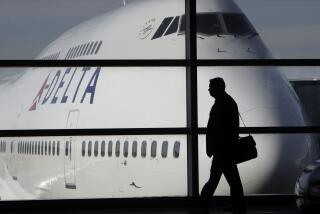Tower Air Is Banking on Flights to Israel
- Share via
NEW YORK — Passengers wanting to fly to Israel while the Persian Gulf War rages have two choices: El Al Israel Airlines and Tower Air, a tiny New York-based carrier seeking to strengthen its position in the postwar market.
Since the beginning of the war last month, several major carriers have dropped out of markets in or near the Middle East because of soaring insurance rates. For Tower, the decision to keep flying is a gamble on future business and a reflection of the commitment of its chairman and owner, Israel native Morris Nachtomi, to the Jewish state.
“When this (crisis) ends,” said Nachtomi in an interview, “traffic to Israel will increase substantially, as always happens (when threats cease). I am placed in the best position because the Israeli market and the Americans who will be traveling to Israel will show a great deal of admiration and respect because we stayed in the market.”
The Israeli government, at least, has expressed some appreciation for Tower’s perseverance. “Tower is proving that it is a carrier that can be depended on in hard times,” says Raphael Farber, Israel’s tourism commissioner for North America. “We consider them very good business partners for the development of tourism from the United States to Israel.”
Continuing service to Israel has not been easy for Tower. Until this week, the only insurance it could get was under a special U.S. government program. But that program only provided coverage for evacuation flights out of Israel that were considered to be in the United State’s interest.
Just before the war began Jan. 16, insurance rates for the Israeli route skyrocketed to $60,000 per flight, from $3,500, according to Commercial Aviation Report, a Dallas-based financial newsletter. Overall premium increases ranged between 500% and 2,000%, with the new levels doubling if, for instance, an aircraft stays on the ground for more than five hours in Tel Aviv, the newsletter said.
Giant carriers such as Pan American World Airways, Trans World Airlines and the European carriers have been forced to suspend service to the Middle East.
Tower qualified for war risk insurance written by the Federal Aviation Administration. The airline’s flights operated under what is called Title 13 premium insurance, the FAA program that offers war risk coverage when commercial coverage is considered too expensive or not available.
Tower began routing planes from Europe to Israel to pick up passengers leaving the country. The logic of the U. S. government’s one-way coverage, said Nachtomi was that “there are Americans in Israel and it is in the American interest to allow them to evacuate on a voluntary basis. But the United States does not consider it its duty to provide Israelis with transportation to fly home. And it doesn’t want to help Americans to go to Israel. It might only have to evacuate them back to the U.S. later.”
Before this week, Tower said it could not get commercial insurance at any price. Insurance has now become available because, Nachtomi said, insurers realized that they “overreacted to the war threat.” Tower is now paying a premium equal to $100 per passenger for flights in and out of the country, a rate Nachtomi said is not economical, but he does not want to abandon the route.
Tower pilots said they don’t consider the Israel route particularly dangerous, despite the threat of Iraqi Scud attacks.
“I don’t have any qualms about going in and out of this area,” says pilot William Arcamuzi, an eight-year Tower veteran who quit Continental Airlines back in 1984 when it broke the pilots’ union during a strike. “Our own military guarantees safe passage and the Israeli military certainly does. I flew into Vietnam and that was more hazardous.”
Tower, founded as a charter carrier and tour operator, has been operating scheduled service to Israel and to Scandinavia since 1983. With five planes and 500 employees, it intends to add scheduled service from New York to Paris in May.
In normal times, Tower has about 15% of the U.S.-Israel traffic. It operates three flights a week to Israel in the winter months and five in the summer from New York. It also flies between Miami and Israel. By following up closely on reservations, Nachtomi said the planes fly 91% full.
The airline has also developed a marketing strategy to help it lure Israeli business. It provides some services that aren’t found on El Al, Nachtomi said. The airline has tried to accommodate passengers who don’t want to forgo certain religious practices during long flights. For example the airline’s Boeing 747s are fitted with a special section in which Orthodox Jews may conduct their prayers in private, he said.
More to Read
Inside the business of entertainment
The Wide Shot brings you news, analysis and insights on everything from streaming wars to production — and what it all means for the future.
You may occasionally receive promotional content from the Los Angeles Times.









